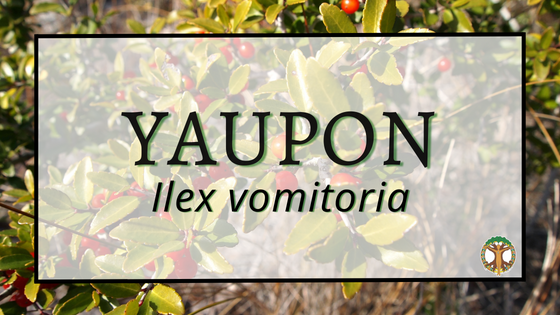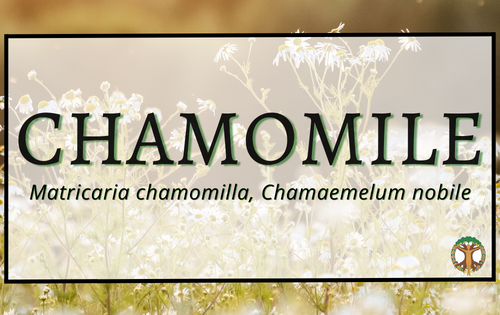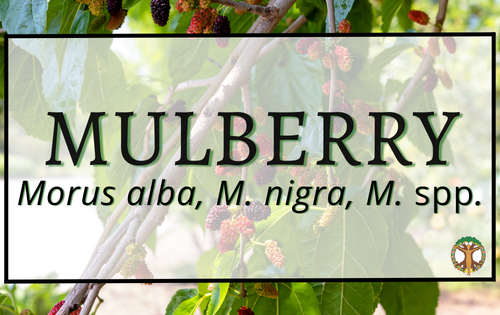
Yaupon
Contributed by Maggie O’Halloran
Common Names Yaupon Holly, Yaupon, Cassina
Latin Name Ilex vomitoria
Family Aquifoliaceae (Holly Family)
Habitat
Like many other hollies, yaupon holly is an evergreen shrub or tree that is loved for the colorful berries it produces on the female plants. Native to the land now called the United States this bushy holly plant is in the same family as yerba mate and guayusa. Hardy and drought resistant, it grows wild in the Southern United States and Mexico zones 7-9. Native to a variety of areas including sandy woods, dunes, open fields, forest edges, and wet swamps, often along the coastal plain and maritime forests, from southern Colorado to Mexico, Virginia, and Florida. It can be grown with little maintenance in the way of fertilizers. Yaupon is also salt and frost tolerant, as well as pest and disease-free; pesticides are rarely needed. This fast-growing tree can grow up to 30 feet but keeping the height around 7 to 8 feet is optimal. The trees can be harvested after two or three years, harvest occurs once a year.
Parts Used
Leaves
History/Tradition
The indigenous Timucua people of Florida called Yaupon Cassina, and believed that it purified the mind and body of those who drank it. The leaf’s natural caffeine and powerful antioxidants led it to be consumed beginning more than 8000 years ago. The leaves were roasted, infused in boiling water, and drank hot from elaborately carved whelk shells.
Energetics
Flavor: Pungent, Bitter
Temperature: Warming, Heating
Moisture: Slightly Drying, Dry
Tissue State: Tight
Indications
digestion, cancer, heart health, type 2 diabetes, neurodegenerative support
Systems
Immune, Digestive, Cardiovascular, Lymphatic
Actions
Anti-oxidant, anti-inflammatory, anti-bacterial, anti-cancer, cardiovascular protective, neuro-protective
Cautions
No known cautions with moderate use
Constituents
Quercetin-rutinoside (Saponin) – anti-viral, anti-diabetic, anti-inflammatory; Kaempferol 3-rhamnoside – antioxidant, cardiovascular support, anti-cancer, anti-microbial, neuro-protective; Kaempferol 3-rutinoside – antioxidant, anti-inflammatory, anti-cancer, anti-allergic; Isorhamnetin – antioxidant flavanol; Cytotoxin – potent antioxidant activity; Chlorogenic Acid – antioxidant, slows the release of glucose in bloodstream; Caffeine, theobromine, theophylline and theacrine (Alkaloids) offer focus, energy, and stamina; The alkaloid theobromine is also the same constituent found in chocolate that induces euphoric feel-good sensations. In vitro studies suggest polyphenolic and flavanol compounds extracted from Yaupon leaves have a chemopreventative effect. Polyphenols are micronutrients that we get through certain plant-based foods. They’re packed with antioxidants, and potential health benefits.
Culinary Use
Used in tea, it’s caffeine content makes it a great alternative to the imported tea that 159 million Americans drink every day, Camellia sinensis. The leaves of Ilex vomitoria can be harvested fresh for a green tea flavor or dried then roasted for a more hearty flavor similar to black tea. This is the only native plant known to contain caffeine in North America and produces 30% more antioxidants than the typical black and green tea. The tannin content is low compared to more familiar teas brewed with Camellia sinensis leaves, so it is difficult to over steep and does not become bitter easily. The saponin content of the berries find them being used as soap or bubbles occasionally as well.
Other Uses
A favorite native landscaping plant in Southern states, it is well appreciated for its beautiful red berries of the female plant. It is commonly used in commercial landscaping to building hedges.
References:
https://mountainroseherbs.com/dark-roast-yaupon-tea
Borden MA, Dale AG. Native and Edible Ornamental Plant Congeners Enhance Ecosystem Services Through Key Pest Avoidance and Multifunctionality in Residential Landscapes. Environ Entomol. 2020 Oct 17;49(5):1206-1213. doi: 10.1093/ee/nvaa099. PMID: 32860053.
Crown PL, Gu J, Hurst WJ, et al. Ritual drinks in the pre-Hispanic US Southwest and Mexican Northwest. Proc Natl Acad Sci U S A. 2015;112(37):11436-11442. doi:10.1073/pnas.1511799112
Gan RY, Zhang D, Wang M, Corke H. Health Benefits of Bioactive Compounds from the Genus Ilex, a Source of Traditional Caffeinated Beverages. Nutrients. 2018 Nov 5;10(11):1682. doi: 10.3390/nu10111682. PMID: 30400635; PMCID: PMC6265843.
Noratto GD, Kim Y, Talcott ST, Mertens-Talcott SU. Flavonol-rich fractions of yaupon holly leaves (Ilex vomitoria, Aquifoliaceae) induce microRNA-146a and have anti-inflammatory and chemopreventive effects in intestinal myofibroblast CCD-18Co cells. Fitoterapia. 2011 Jun;82(4):557-69. doi: 10.1016/j.fitote.2011.01.013. Epub 2011 Jan 22. PMID: 21262328.





